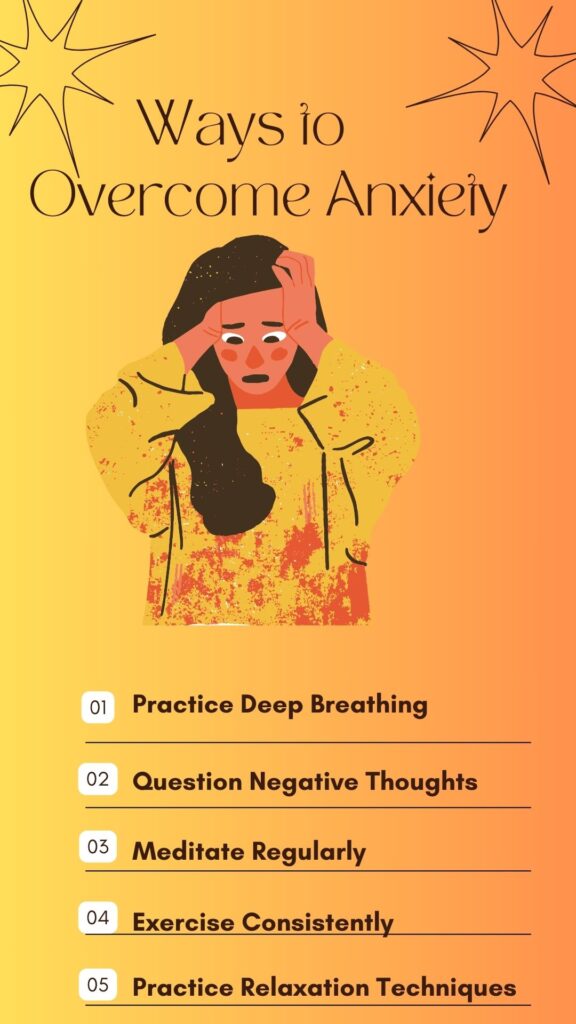Ways to Overcome Anxiety in Your Daily Life
Anxiety is a normal reaction to real or perceived threats, but it can be overpowering when it interferes with daily life. Ways to overcome anxiety in your daily life include implementing practical tactics and making lifestyle modifications. Anxiety, whether it is a transient mood or a persistent problem, can be effectively addressed through mindfulness, exercise, proper time management, and relaxation techniques. Here’s how to manage anxiety and enhance your mental health for a more balanced and peaceful life.

Understanding Anxiety
Anxiety manifests as worry, nervousness, or fear about future events. While occasional anxiety is normal, persistent anxiety that disrupts daily life may require attention. Breathing quickly, perspiration, elevated heart rate, and trouble focusing are typical physical signs.
Immediate Techniques to Manage Anxiety
If you experience unanticipated anxiety, these quick coping strategies can help:
1. Question Negative Thoughts
Consider whether your fears are justified. Consider whether your worry is justified and how you might regain control of the situation.
2. Practice deep breathing
Deep breathing calms the body and mind. Apply the 4-7-8 technique: take a four-count breath, hold it for seven, and then release it for eight. Repeat this technique four times to reduce anxiety.
3. Use aromatherapy
It might be soothing to inhale natural scents like sandalwood, chamomile, and lavender. Use incense, candles, or essential oils to create a calming ambience.
4. Move your body
Walking, yoga, and tai chi are examples of physical activities that can help you focus on your body rather than your anxious thoughts, which can reduce stress and elevate your mood.
5. Use grounding techniques
The 333 Rule can be used to ground yourself:
- Name three sounds that you can perceive.
- Name three items that you can see.
- Touch three items around you.
This strategy allows you to stay in the current moment.
Long-Term Strategies to Reduce Anxiety
Adopting persistent practices can make a significant difference in addressing ongoing anxiety.
1. Identify and manage triggers
Determine whether stress, coffee, or unresolved trauma are the main causes of your anxiety. Keeping a journal may help you recognize triggers and patterns.
2. Consider therapy
For the treatment of anxiety, psychotherapies like Cognitive Behavioral Therapy (CBT) work quite well. Therapists can help you reframe worried thoughts and create specific coping strategies.
3. Discuss Medication with Your Doctor
Drugs such as benzodiazepines or SSRIs may be used if anxiety significantly affects your life. Always consult with a healthcare provider to explore your options.
4. Meditate regularly
Mindful meditation allows your brain to calm worried thoughts. You can begin practising yoga or walking meditation with the use of apps and guided meditations.
5. Establish strong social connections
You may feel less alone and be more able to handle stress if you spend time with supportive friends or relatives. Socializing can boost your mood and distract you from anxious thoughts.
6. Exercise consistently
Regular physical activity boosts endorphins, lowers cortisol levels, and promotes better sleep, all of which aid in anxiety relief.
7. Eat a balanced diet
Include anti-anxiety foods such as omega-3 fatty acids, green tea, and magnesium-rich vegetables. Sugar and caffeine can make symptoms worse, so stay away from them.
8. Practice relaxation techniques
Tai chi, mindfulness, and progressive muscle relaxation are among the relaxation techniques that might help ease the physical tension associated with worry.
Overcoming Fear and Avoidance
Usually, anxiety results in avoidance, which over time can make fears worse. Facing your concerns in short, achievable steps helps you desensitize and gain confidence in dealing with unpleasant situations.
When to Seek Professional Help
If your anxiety lasts for weeks, causes panic attacks, or seriously impairs your life, see a doctor. You can regain control and find comfort through therapy, medication, and other therapies.
Final Thoughts
Anxiety doesn’t have to control your life. Combining immediate approaches can lead to the development of a long-term strategy for anxiety management and reduction. Remember that seeking assistance from mental health professionals is always a great step toward recovery.
Take small steps today to have a more tranquil, fulfilling life.